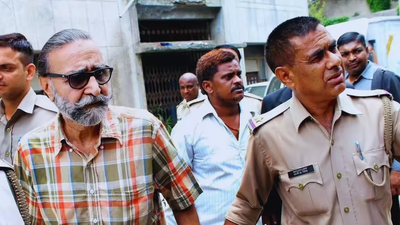NEW DELHI: In one of the most dramatic reversals in legal history, 2006 Nithari serial killings accused Surinder Koli, who was sentenced to death by various courts in 13 murder cases and nearly executed twice, is set to walk out of prison a free man after 19 long years. After being convicted and awarded death sentence by the trial court, Allahabad HC and the Supreme Court – which had dismissed his appeal as well as review plea – the apex court on Tuesday cured the mistake in a curative petition filed by Koli in the last case pending against him. A curative petition is the final judicial resort for an accused to seek justice. A bench of Chief Justice B R Gavai, Justices Surya Kant and Vikram Nath granted relief to Koli in the Rimpa Haldar murder case on the ground that the court had held the same evidence inadmissible in 12 other murder cases in which he had been acquitted. SC had in 2011 upheld Koli’s conviction and death sentence in the Haldar case and dismissed the review petition in 2014.

Police lapses made crucial proof invalid In July, SC had upheld Allahabad HC’s Oct 2023 judgment acquitting Koli in 12 Nithari murder cases of Noida on the ground that police lapses had rendered crucial evidence inadmissible. Armed with July’s order, Koli in Sept invoked curative jurisdiction of SC and contended that the nature of evidence in all 13 cases were similar and two set of outcomes – acquittal and conviction – resting on the same evidentiary foundation cannot lawfully coexist. Allowing his plea, the court said, “When final orders of this court speak with discordant voices on an identical record, the integrity of adjudication is imperiled, and public confidence is shaken. In such a situation, intervention ex debito justitiae (as a matter of justice) is not an act of discretion but a constitutional duty. We therefore entertain this petition to preserve the purity of this Court’s process and to vindicate the rule of law.” The bench noted that the apex court had already held that Koli’s confession which led to the conviction was legally tainted and not admissible and that would be applicable in the Haldar case too. “To allow a conviction to stand on evidentiary basis that this court has since rejected as involuntary or inadmissible in the very same fact matrix offends Article 21 of the Constitution. It also violates Article 14 of the Constitution, since like cases must be treated alike. Arbitrary disparity in outcomes on an identical record is inimical to equality before the law,” the bench said. It said the offences in Nithari were heinous, and the suffering of the families was beyond measure but it was a matter of deep regret that despite prolonged investigation, the identity of the actual perpetrator had not been established in a manner that met legal standards. “Criminal law does not permit conviction on conjecture or on a hunch. Suspicion, however grave, cannot replace proof beyond reasonable doubt. Courts cannot prefer expediency over legality. The presumption of innocence endures until guilt is proved through admissible and reliable evidence, and when the proof fails the only lawful outcome is to set aside the conviction even in a case involving horrific crimes,” it said. It said numerous loopholes were common to all Nithari cases. “These gaps were central to the acquittals in the 12 cases. They are equally present here,” the court said.




